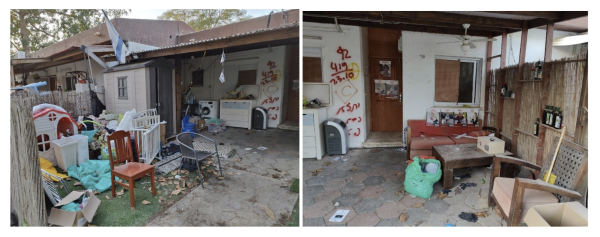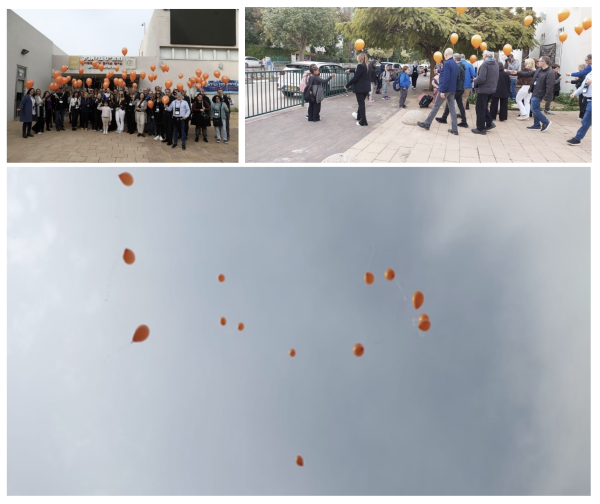By Leah Garber
The second JCC Movement solidarity mission to Israel is here this week to bear witness.
Some 40 JCC Association board members and executive directors arrived in Israel, firmly demonstrating that the JCC Movement in North America stands by Israel in its difficult time. They are here to express their solidarity with the people of Israel.
The days are full of sights, conversations, and meetings with the heroes of the war. And the nights are for thinking, rethinking, digesting, and trying to unpack the horrors seen during the day. It’s hard to witness the atrocities; it’s harder to know that so many have gone through them.
But it is about the sounds of war—the sounds we heard, and the ones we didn’t.
We heard Danny Miran’s cry. Danny is Omri Miran’s father. Omri was kidnapped 103 days ago, and left behind his wife and two daughters. Danny’s broken yet determined voice reflected the heartbreak. The sound of a broken heart is the saddest melody, one of endless despair.
We listened to Daniel Weiss’s beautiful voice. Daniel, a talented musician, lost both his parents. His father was murdered in Kibbutz Be’eri, and his mother was kidnapped to Gaza, where her body was found. Daniel played his guitar, the one his father gave him, and sang a song that ended with “Toda, Aba and Ima | Thank you, Mom and Dad” for giving me life. Daniel’s heavenly voice penetrated our hearts, tore them apart, and left us with the resonating sound of bereavement.
We heard the terrible silence of a community center with no community. The Eshkol region near Gaza lost too many of its members. Many were murdered or abducted. The wonderful building, usually bustling with life and children’s laughter is abandoned. Local families have all been evacuated. Walls alone are just a building. The community center needs the community. The silence was jarring, deafening.
We closed our eyes and imagined the wonderful music, the sounds of love and peace at the Nova Festival. We heard the sounds, the loud, joyful voices of 3,500 festivalgoers who came to celebrate life. But then we forced our ears to hear the terrified screams of the murdered, the painful cries of the raped, the terrorists’ deafening shouts of hatred, and the whispers of those hiding in the bushes, begging for help.
The contrast between the sounds of joy at the beginning of the festival and the sounds of the 346 murdered and 40 kidnapped were the most horrible sounds human ears can hear. And we heard them both.
And then, as we walked along the paths of Kibbutz Nir Oz, we heard the stories of the murdered and kidnapped. We moved from one burned house to another. Every home has a name, every yard has a story of a family. Once, only 103 days ago, the kibbutz held the sounds of life and joy, but these sounds are gone now. Death took over the desolate kibbutz, and death has no sound.
But we also heard the artillery from across the border with Gaza, less than a mile away. So close, yet so far. These sounds of war reminded us that while we are walking the death paths of the kibbutz, our sons are fighting in Gaza against the cruel enemy who, 103 days ago, desecrated the beautiful paths of this kibbutz and many others, seeding nothing but destruction and pain.

When we arrived at the Bibas family home, we saw remnants of childhood. In the front yard was a broken baby’s crib, K’fir’s crib. We saw the child’s playhouse, where K’fir and his four-year-old brother, Ariel, played on October 6, but not after.
The family’s pictures—father Jordan, mother Shiri, and the children, K’fir and Ariel—are hung on the home’s front door. They are all is smiling, one beautiful, happy family. Images of life before the destruction. We stood there and listened to Shiri’s begging, we heard K’fir crying, Ariel pleading. Silence was screaming, the desperation was deafening.
And finally, we met Israeli community center members from the north and south, who continue to manage a community center even though all their members are scattered throughout hotels and temporary residences. These people, having been evacuated, may be homeless, but they are not without community. They crave social activity, companionship, comfort.
It was then that we heard different sounds.
We heard the loud voice of promise. The resilience of the wonderful community leaders, their dedication, devotion, and honest belief that the sun will shine again. One day, someday, at the end of this long and dark winter, awaits the comforting voice of hope.
Then, to mark baby K’fir’s first birthday, we stepped out, intending to inflate orange balloons in honor of the two beautiful, redheaded brothers who unfortunately have become a symbol. We were going to release the balloons to fly up above, carrying a prayer that K’fir and Ariel will be freed soon—to play with balloons, celebrate birthdays and holidays, and live. Just live. As we were about to inflate the balloons, a bunch of school children passed by. School was over and these kids were on their way home to see mom and dad. To do what kids around the world do. All kids—but not K’fir and Ariel.
We decided to hand some balloons to the kids and inflate them together. Their normally cheerful voices and laughter were the remedy we so needed, following long days of crying, sorrow, and grief. Theirs are the sounds of the future, sounds that still await us—when we will all laugh again.

The pain is great, the cries out to heaven are still unbearably loud. But the solidarity from the JCC Movement’s leaders; the determination of Israeli society; the commitment of our soldiers in battle; the laughter of the children, unaware of the horrors that took place; and the rays of sunshine from time to time remind us that even from the terrible disasters that have befallen us, we will emerge.
Our eyes swollen from crying will rest, our broken hearts will try to heal, and a day will come when we inflate balloons of all colors—happy and cheerful balloons, together with K’fir, Ariel, and all the hostages.
The day will come, and until then, little, sweet K’fir, may this be your last sad birthday ever, and may your beautiful eyes smile again—with Ariel, Mom, and Dad by your side.
Together, united, we will overcome.
Leah Garber is a senior vice president of JCC Association of North America and director of its Center for Israel Engagement in Jerusalem.
Reader Interactions